In 2025, compliance with Anti-Money Laundering (AML) and Know Your Customer (KYC) regulations has become critical for offshore funds due to stricter global regulations and increasing scrutiny. Advanced tools now help fund managers efficiently meet these requirements while minimizing risks. Here’s a quick overview of the top solutions:
- Fenergo: Automates onboarding, beneficial ownership discovery, and regulatory updates. Supports complex ownership structures and integrates with fund systems.
- KYC-Chain: Simplifies multi-jurisdictional compliance with AI-powered risk scoring and ownership mapping. Reduces onboarding times significantly.
- ComplyAdvantage: Offers real-time transaction monitoring, AI-driven risk scoring, and seamless integration for compliance workflows.
- Refinitiv World-Check: Provides extensive global sanctions, PEP screening, and adverse media monitoring using a vast database.
- Feedzai: Specializes in real-time fraud detection and behavioral analytics for high-volume transactions.
- LexisNexis Risk Solutions: Combines a global risk database with AI to handle ownership structures and compliance for offshore jurisdictions.
- Charter Group Fund Administration: Integrates AML/KYC compliance with fund administration, focusing on offshore hubs like the Cayman Islands.
These tools help offshore funds navigate complex regulations, reduce manual compliance tasks, and improve risk management. Below is a comparison of their features and strengths.
Quick Comparison
| Tool | Key Features | Best For | Pricing |
|---|---|---|---|
| Fenergo | Onboarding automation, regulatory updates, ownership mapping | Multi-jurisdictional funds | Custom pricing |
| KYC-Chain | AI risk scoring, document verification, beneficial ownership mapping | Funds with complex structures | Custom pricing |
| ComplyAdvantage | Real-time monitoring, AI-powered risk scoring, regulatory updates | Scalable compliance for growing funds | Volume-based pricing |
| Refinitiv World-Check | Global PEP screening, sanctions checks, adverse media monitoring | Funds needing extensive global coverage | Volume-based pricing |
| Feedzai | Fraud detection, behavioral analytics, real-time monitoring | High-volume transaction funds | Enterprise pricing |
| LexisNexis | Ownership mapping, sanctions screening, global risk database | Offshore funds in complex jurisdictions | Enterprise pricing |
| Charter Group | Integrated compliance and fund administration, investor portals | Offshore-focused funds (Cayman, BVI) | Service-based pricing |
These solutions vary in their focus, from AI-driven automation to integrated fund administration, making it important to choose one that aligns with your fund’s specific needs.
Cayman Islands AML Trends & Best Practices for Investment Funds | Waystone
Key Requirements for Offshore Fund AML/KYC Compliance
Offshore funds operate within a maze of stringent compliance rules that extend far beyond mere documentation. At the heart of any effective compliance program are three key components: beneficial ownership identification, source of funds verification, and ongoing transaction monitoring.
Beneficial ownership identification is about uncovering the individuals who ultimately own or control 25% or more of the fund. This means digging through layers of corporate structures to gather names, IDs, addresses, and detailed ownership charts. Offshore setups often complicate this process, with shell companies and intricate trust arrangements making ownership hard to trace. When dealing with high-risk jurisdictions or politically exposed persons (PEPs), enhanced due diligence becomes critical.
Source of funds verification ensures that the origins of invested capital are legitimate. This requires collecting documents like bank statements, tax returns, and investment disclosures. For higher-risk clients, the process may escalate to forensic audits. Because regulations differ from one jurisdiction to another, having standardized procedures can help streamline this otherwise complex task.
Ongoing transaction monitoring involves real-time systems that flag unusual activity, conduct regular compliance checks, and keep detailed audit trails. This isn’t just about spotting suspicious individual transactions – it also includes analyzing relationship patterns, geographic risks, and behavioral anomalies. Such monitoring ensures that potential red flags are promptly reported to the appropriate authorities, setting the stage for advanced screening and regulatory actions.
Modern compliance frameworks also require offshore funds to perform sanctions checks, PEP screening, and adverse media monitoring against global watchlists. Automated tools now make this process more efficient, with some platforms able to screen investors and transactions in real time, supporting over 14,000 document types across 220+ countries. These capabilities simplify onboarding for international investors while ensuring compliance across various jurisdictions.
The regulatory environment continues to shift. For instance, the extension of the Bank Secrecy Act, effective January 1, 2028, will impose stricter requirements for due diligence, reporting, and recordkeeping. This marks a major increase in compliance obligations for offshore funds, which have historically operated with limited oversight.
AI-driven solutions are reshaping how funds manage these challenges. Advanced platforms now reduce false-positive alerts for suspicious activity by up to 85% through machine learning and sophisticated data analysis. These tools automate risk scoring, improve anomaly detection, and make it easier to identify complex ownership structures.
Another breakthrough is Perpetual KYC, which replaces periodic reviews with continuous, automated updates to client information. By leveraging real-time data and AI, this approach ensures that client profiles remain up-to-date and emerging risks are caught early. Transitioning from event-based checks to continuous monitoring not only enhances compliance but also minimizes the risk of regulatory violations.
Automation has become essential for navigating the growing complexity of global regulations. AML/KYC systems typically require annual investments averaging $12,000, with costs tailored to specific business needs. This investment cuts down on manual tasks, improves data accuracy, and provides real-time risk insights.
Specialized service providers like Charter Group Fund Administration play a vital role in helping offshore funds meet these stringent requirements. Their expertise spans AML, CRS, and FATCA services tailored for jurisdictions like the Cayman Islands, combining advanced technology with local knowledge to ensure effective compliance and efficient fund management.
1. Fenergo
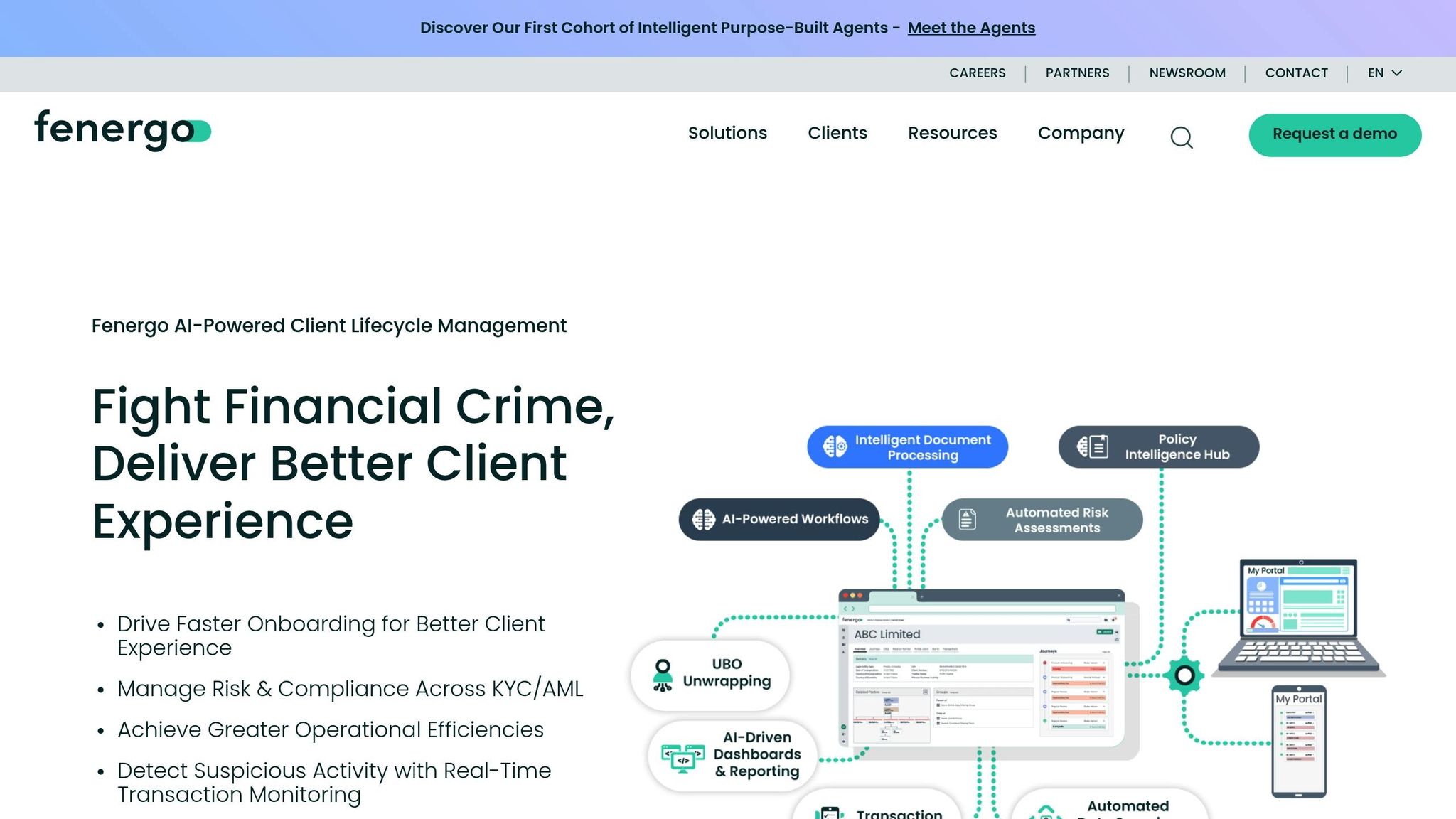
Fenergo is a client lifecycle management platform designed to simplify and automate the intricate AML/KYC processes that offshore funds face. This SaaS-based tool has gained popularity among fund administrators navigating complex regulatory landscapes. Its capabilities were further enhanced in 2022 with the acquisition of Sentinels, which added advanced analytics and real-time transaction monitoring to its arsenal. Let’s dive into how Fenergo uses AI and automation to tackle these challenges.
AI-driven Analytics and Automation
Fenergo utilizes artificial intelligence to streamline compliance workflows for offshore funds. By analyzing vast transaction volumes, its AI models can detect money laundering anomalies and continuously refine their processes to stay ahead of evolving threats. This makes it particularly useful for organizations handling large-scale operations.
The platform’s real-time transaction monitoring engine employs advanced analytics and pre-built data models to identify risks with precision. For offshore funds processing high volumes of transactions daily, this means suspicious activities are flagged immediately. Additionally, its AI-driven risk scoring system categorizes investors based on factors like geographic location, transaction history, and ownership structures, helping administrators prioritize their efforts effectively.
Jurisdictional and Regulatory Compliance Coverage
Fenergo is well-equipped to handle the challenges of operating across multiple jurisdictions. It aligns with global AML standards such as FATF, EU AMLD, and the U.S. Bank Secrecy Act, as well as local regulations in key offshore hubs like the Cayman Islands and British Virgin Islands.
The platform’s regulatory rules engine is continuously updated to reflect changes in laws and guidance, including expanded AML/KYC obligations for private funds under the U.S. Bank Secrecy Act, which take effect on January 1, 2028. This automated updating process ensures compliance without requiring manual tracking of new regulations.
Fenergo’s workflows are highly configurable, allowing fund administrators to tailor onboarding processes to meet jurisdiction-specific requirements. For example, an investor from a high-risk country might automatically trigger enhanced due diligence, while those from lower-risk regions can follow a more streamlined process.
Support for Complex Ownership Structures
Ownership verification for offshore funds can be a daunting task, especially when dealing with multi-layered corporate structures. Fenergo addresses this with beneficial ownership discovery tools that map and visualize intricate ownership chains, helping administrators identify ultimate beneficial owners, even in the most complex cases.
The platform generates visual ownership charts that clarify relationships between entities and individuals. For instance, if a fund receives an investment from a corporation owned by a trust and controlled by another entity, Fenergo can automatically trace and map these connections, simplifying what would otherwise be a time-consuming process.
Integration with Fund Administration Systems
Fenergo’s robust APIs and pre-built connectors enable seamless integration with fund accounting systems, investor portals, and reporting platforms. This ensures real-time data sharing, automated document collection, and unified compliance reporting – all while eliminating duplicate work and reducing errors.
By combining AI-driven risk scoring with beneficial ownership mapping, hedge funds in the Cayman Islands have reported a 40% reduction in onboarding times. This efficiency has also improved the detection of high-risk investors, leading to fewer regulatory findings during audits and boosting investor confidence.
Users frequently highlight Fenergo’s ability to accelerate compliance, prevent fraud, and enhance audit accuracy. For offshore funds committed to maintaining strong AML/KYC standards, it’s a solution worth considering.
2. KYC-Chain

KYC-Chain is a dedicated AML/KYC platform tailored to financial institutions and investment funds that face the challenges of multi-jurisdictional compliance. It specializes in managing complex ownership structures, making it especially useful for funds operating across multiple offshore jurisdictions.
The platform supports KYC checks in over 240 jurisdictions and can process more than 10,000 document types. This extensive scope forms the backbone of its powerful analytics capabilities.
AI-driven Analytics and Automation
KYC-Chain leverages AI and machine learning to process vast datasets, identify irregularities in transactions, and flag potential fraud. By introducing digital workflows, it reduces onboarding times by up to 70%, eliminating manual delays and enabling quicker capital deployment. This efficiency not only speeds up processes but also enhances investor satisfaction.
Its AI-powered risk assessment tools adapt in real time, learning from transaction histories and staying updated with regulatory changes. This dynamic monitoring helps funds stay ahead of emerging money laundering threats and ensures compliance remains proactive rather than reactive.
Jurisdictional and Regulatory Compliance Coverage
Navigating complex regulatory landscapes is a core strength of KYC-Chain. The platform verifies registration documents, business licenses, and certifications across various regions. It ensures adherence to global AML and KYC standards, including those outlined in the Bank Secrecy Act. This capability is particularly critical as regulatory scrutiny grows, with new rules, such as expanded AML/KYC obligations for private funds under the U.S. Bank Secrecy Act, set to take effect on January 1, 2028.
Support for Complex Ownership Structures
KYC-Chain excels in untangling intricate ownership structures. Using advanced corporate data analysis tools, it maps layered arrangements and creates clear organizational charts to track Ultimate Beneficial Owners (UBOs). This is a game-changer for offshore funds dealing with multi-layered investment structures involving holding companies, trusts, and other entities. For instance, if an offshore fund receives investments through a network of interconnected entities, KYC-Chain can trace these links and present them visually, simplifying due diligence and helping administrators meet disclosure requirements for beneficial ownership.
Integration with Fund Administration Systems
KYC-Chain integrates seamlessly with fund administration systems via APIs, enabling automated data sharing for investor onboarding, compliance reporting, and ongoing monitoring. This integration reduces manual workloads and enhances workflows for tasks like NAV calculations, compliance checks, and investor communications. Real-time automation of compliance workflows is a key benefit.
For example, a hedge fund based in the Cayman Islands integrated KYC-Chain with its fund administration system. This allowed the fund to automate investor onboarding and beneficial ownership verification. The result? Faster onboarding, stronger regulatory compliance, and real-time reporting that improved communication with both investors and regulators.
3. ComplyAdvantage
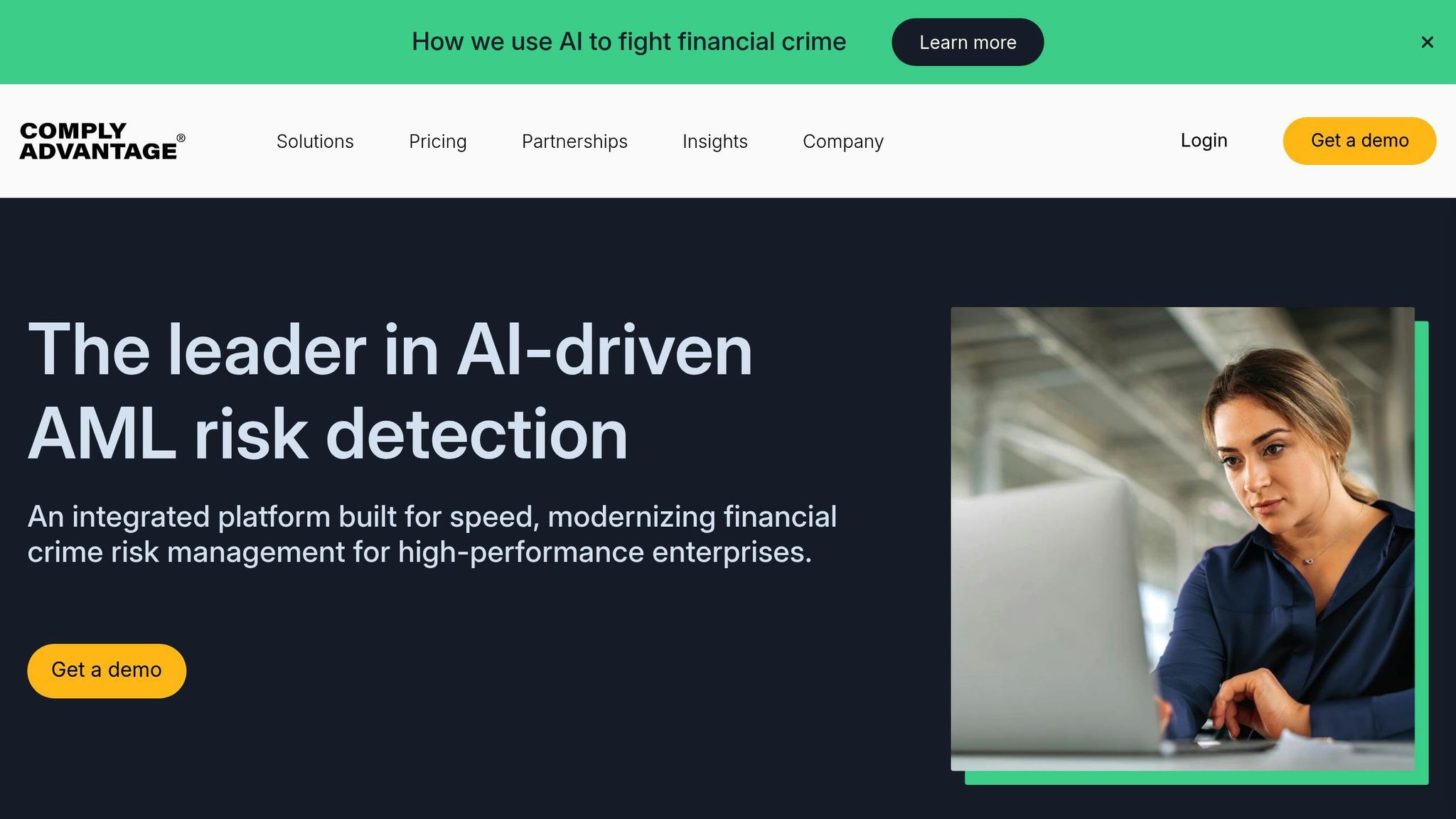
ComplyAdvantage has emerged as one of the top AML software providers in 2025, offering tailored solutions for offshore funds that deal with intricate regulatory requirements. The platform complements other tools by combining advanced analytics with real-time regulatory updates, ensuring smoother and more compliant operations for offshore funds.
AI-driven Analytics and Automation
ComplyAdvantage uses cutting-edge AI to reshape how offshore funds manage AML and KYC processes. Its AI-powered analytics provide real-time risk scoring, detect patterns, and identify anomalies – critical features for funds handling high transaction volumes or complex ownership structures.
The platform automatically flags suspicious activities and simplifies customer due diligence while minimizing false positives during transaction monitoring. For example, it can identify unusual fund movements or changes in beneficial ownership, enabling compliance teams to focus on genuinely high-risk scenarios.
Real-time transaction monitoring is at the heart of ComplyAdvantage’s features. Its behavioral analytics adjust to new threats, offering a proactive defense against financial crimes while keeping operations efficient. Beyond its analytics, the platform ensures that funds remain fully compliant with regulatory requirements.
Jurisdictional and Regulatory Compliance Coverage
Navigating global regulations can be daunting, but ComplyAdvantage makes it manageable through continuous updates. Offshore funds often face diverse regulatory demands, and this platform provides support for key global AML and KYC regulations, including the Bank Secrecy Act (BSA), FATF recommendations, and local laws in offshore hubs like the Cayman Islands, British Virgin Islands, and Luxembourg.
What sets ComplyAdvantage apart is its automated regulatory update system. The platform continuously refreshes its database to reflect changes in both international and local laws, eliminating the need for manual updates. With features like real-time alerts and customizable compliance rules, the system helps funds adapt to new regulations seamlessly and maintain audit-ready compliance programs.
Support for Complex Ownership Structures
Offshore funds often deal with intricate ownership setups that span multiple jurisdictions. ComplyAdvantage tackles these challenges with its proprietary AI-driven ownership mapping technology, which goes beyond standard beneficial ownership tools.
This technology can analyze organizational charts, cross-check global databases, and flag hidden relationships or inconsistencies. It processes a variety of data, including identification documents, beneficial ownership records, source of funds documentation, and jurisdictional registrations.
The platform also offers real-time screening against global PEP and sanctions lists. By leveraging AI, it reduces false positives while ensuring timely identification of politically exposed persons or sanctioned entities. This feature is particularly important for offshore funds attracting international investors who face varying levels of regulatory scrutiny.
Integration with Fund Administration Systems
ComplyAdvantage features robust API capabilities, making it easy to integrate with leading fund administration platforms and investor portals. This integration embeds compliance directly into fund operations, breaking down silos and streamlining workflows.
For instance, when a new investor is onboarded, their details are automatically screened and risk-assessed without requiring manual input. This automation speeds up the onboarding process while ensuring thorough and consistent compliance checks. The integration also enables automated data sharing for ongoing monitoring, regulatory reporting, and investor communications.
The benefits go beyond just saving time. One hedge fund, for example, reduced its manual compliance workload by 40% after implementing ComplyAdvantage. At the same time, it achieved more consistent regulatory reporting and improved audit readiness. This highlights how effective integration can lead to both operational efficiency and stronger compliance outcomes.
4. Refinitiv World-Check
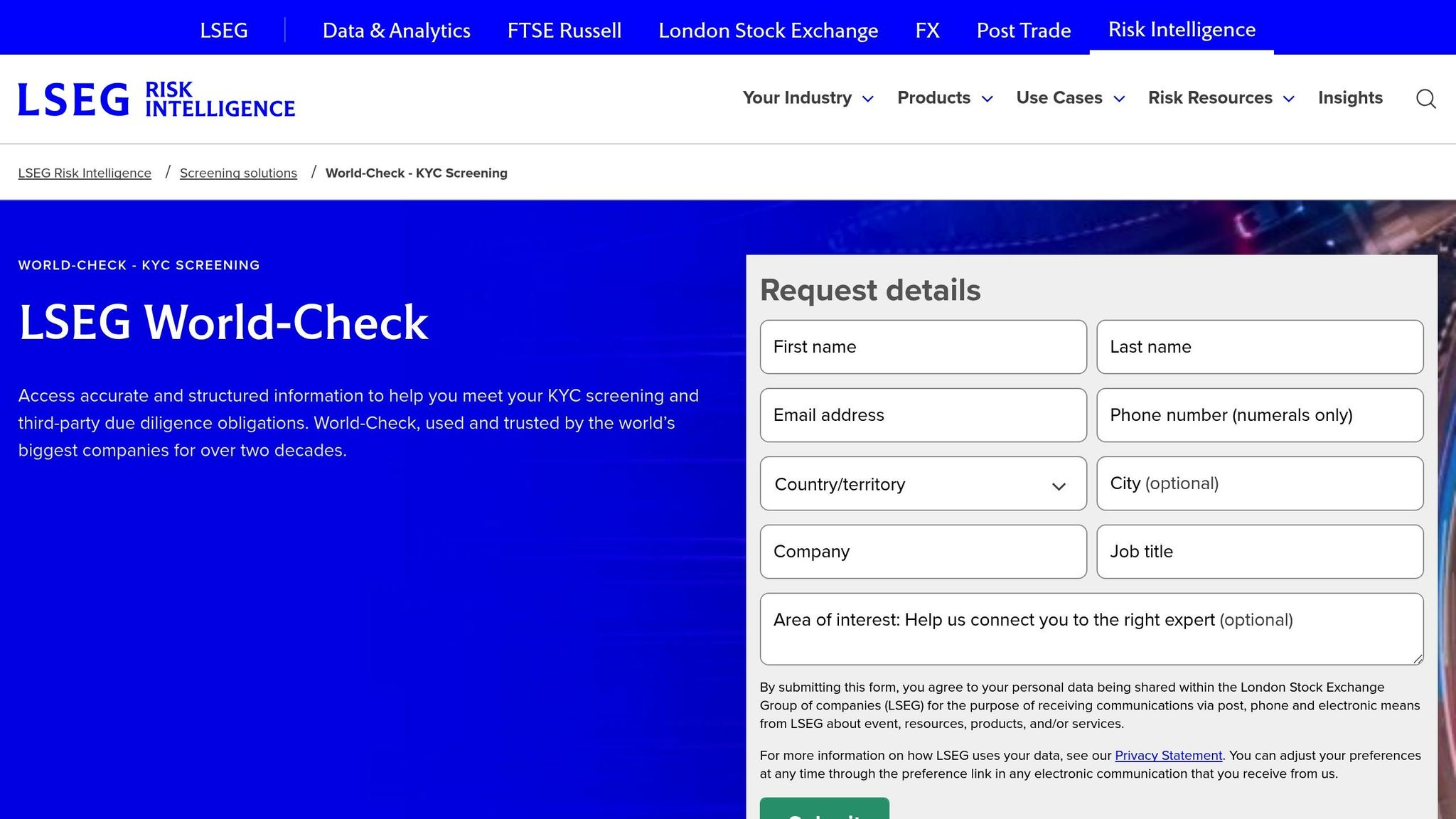
Refinitiv World-Check is a widely recognized risk intelligence tool trusted by over 10,000 organizations. It provides screening capabilities across more than 240 countries and maintains a database of 4 million risk profiles.
This platform stands out for its broad coverage, including global sanctions, politically exposed persons (PEPs), and adverse media. It’s particularly valuable for offshore funds operating in regulatory hubs like the Cayman Islands, British Virgin Islands, and Luxembourg, where meeting international compliance standards is non-negotiable. Here’s how World-Check addresses the intricate demands of offshore compliance.
AI-Powered Screening and Monitoring
World-Check uses advanced AI to revolutionize risk screening and monitoring. By automating the analysis of massive datasets, it identifies suspicious patterns and anomalies with precision. Its AI-driven risk scoring system helps cut down on false positives, ensuring more accurate assessments. The platform also provides real-time updates, flagging new risks such as changes in a PEP’s status or new sanctions as they occur. This level of automation ensures continuous compliance without the need for constant manual oversight, keeping pace with ever-changing global standards.
Comprehensive Regulatory and Jurisdictional Coverage
The platform supports key global AML and KYC regulations, including FATF recommendations, EU directives, U.S. sanctions, and U.K. compliance standards, while also adapting to the specific needs of offshore jurisdictions. With daily updates and over 100,000 new records added each month, its database remains up-to-date and relevant. Customizable settings allow offshore funds to navigate both international and local compliance requirements, while also addressing challenges like cross-border data privacy.
Managing Complex Ownership Structures
Offshore funds often deal with intricate corporate structures spanning multiple jurisdictions, and World-Check is designed to handle this complexity. Its algorithms map beneficial ownership across subsidiaries and affiliates using sources like corporate registries and regulatory filings. With insights across more than 60 risk categories, the platform delivers detailed analyses of risks tied to entities and individuals. These insights integrate seamlessly into broader compliance processes, simplifying the management of complex ownership networks.
Seamless Integration with Fund Administration Systems
World-Check offers robust API connectivity, enabling it to integrate directly with fund administration platforms and investor portals. This allows risk screening to become a natural part of operational workflows. For example, during investor onboarding, the platform processes new investor data automatically, generating risk assessments and compliance reports without manual effort. It also supports detailed compliance reporting and maintains audit trails, which are critical during regulatory examinations.
sbb-itb-9792f40
5. Feedzai
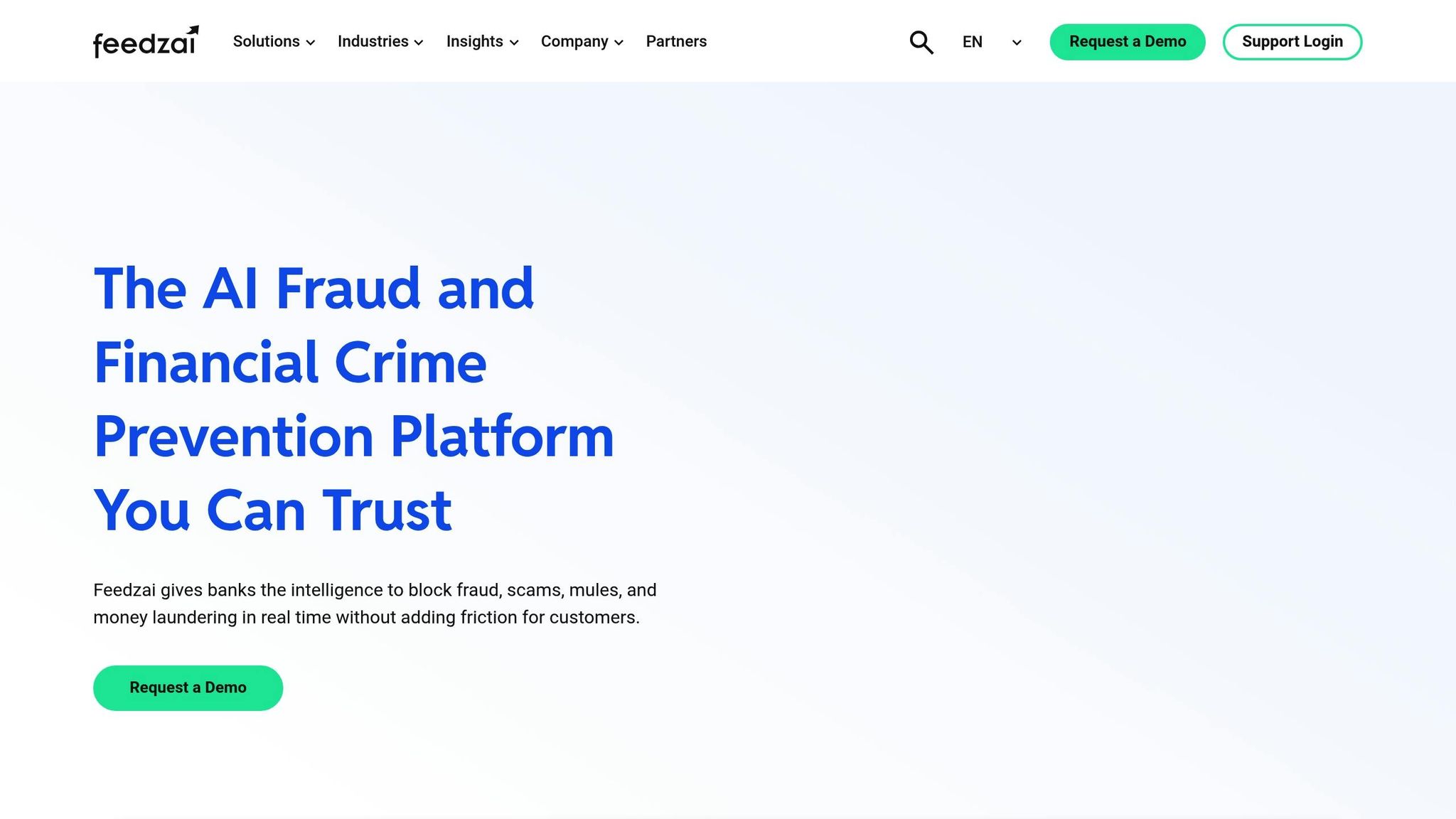
Feedzai stands out as a powerful tool that uses AI to tackle the intricate challenges of offshore fund compliance. It’s a cutting-edge AML/KYC platform that employs artificial intelligence and machine learning to fight financial crime in real time. Built for high-volume operations, it handles massive transaction loads while ensuring strict adherence to regulatory standards.
AI-Driven Analytics and Automation
Feedzai’s AI models are trained on billions of transactions, allowing them to spot new money laundering patterns and adapt much faster than traditional, rule-based systems. With real-time monitoring and behavioral analytics, the platform handles repetitive compliance tasks efficiently. One major advantage? It reduces false positives by up to 80% compared to older systems. This level of automation is key to managing the complexities of compliance in today’s fast-paced financial world.
Jurisdictional and Regulatory Compliance Coverage
What makes Feedzai particularly versatile is its ability to meet a wide range of regulatory requirements. Its compliance modules are configurable to fit the needs of different regulatory environments. Whether you’re dealing with the Cayman Islands, the British Virgin Islands, or other offshore hubs, the platform adapts to local laws while aligning with global standards. Plus, it stays up-to-date with regulatory changes through automated rule updates and alerts. For instance, U.S.-based offshore fund managers will find it especially helpful as they prepare for new Bank Secrecy Act requirements coming into effect on January 1, 2028.
Support for Complex Ownership Structures
Offshore funds often involve intricate ownership layers that span multiple jurisdictions, making due diligence a daunting task. Feedzai’s AI models excel at unraveling these complex corporate hierarchies. By integrating both public and proprietary data, the platform identifies ultimate beneficial owners and flags potentially risky structures. This capability not only enhances due diligence but also provides the transparency that regulators increasingly demand.
6. LexisNexis Risk Solutions
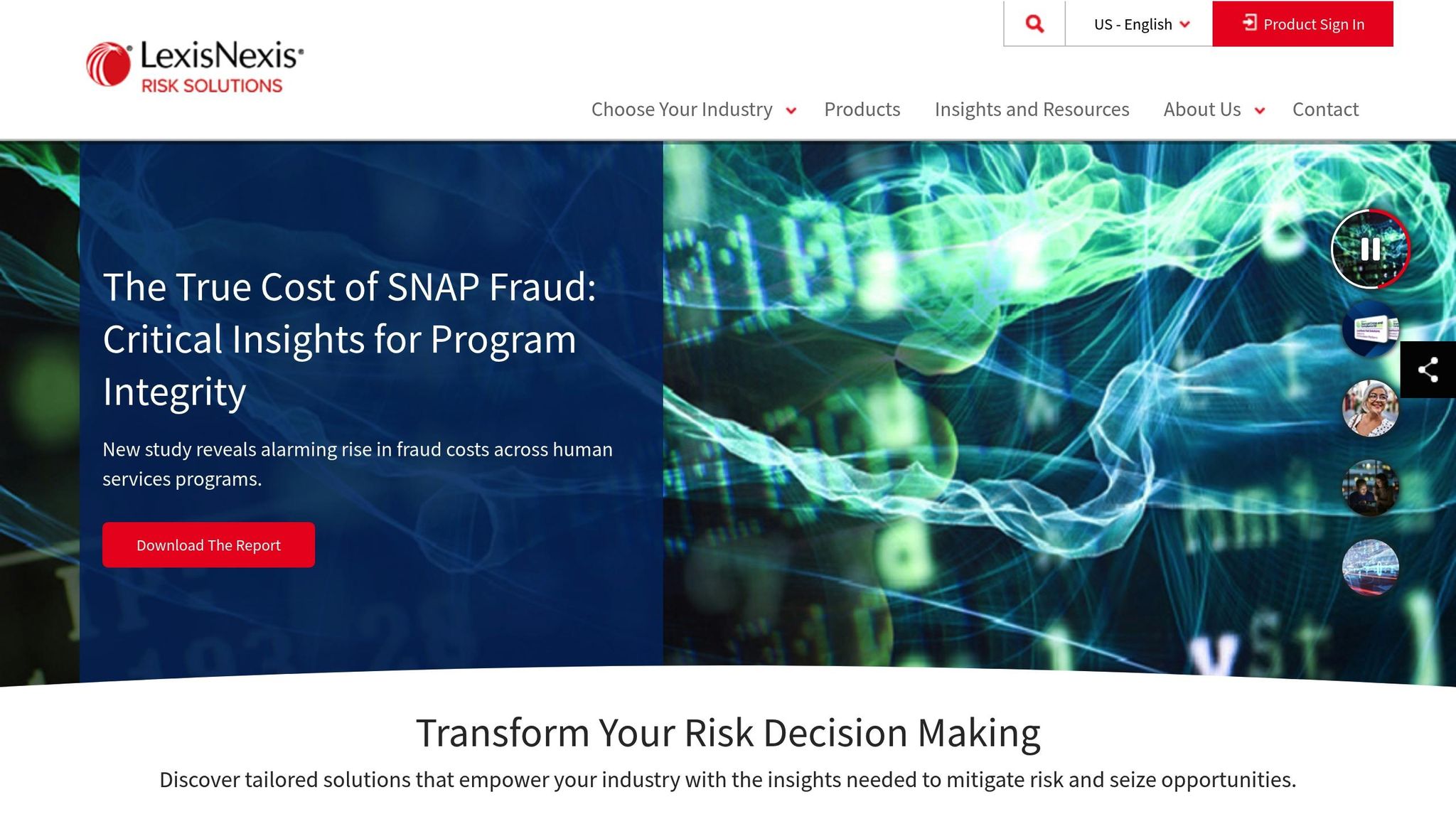
LexisNexis Risk Solutions combines decades of expertise in data management with cutting-edge tools to tackle the challenges of offshore fund compliance. Trusted by over 5,000 institutions worldwide, it has become a go-to partner for navigating complex regulatory landscapes. A standout feature is its WorldCompliance database, a vast risk intelligence resource that pulls information from thousands of global sources. This database forms the backbone of its enhanced due diligence and ongoing monitoring capabilities, further strengthened by AI-driven tools designed to simplify intricate compliance tasks.
AI-Driven Analytics and Automation
The platform employs advanced AI and machine learning to uncover sophisticated money laundering schemes and emerging risks that might evade traditional systems. This technology doesn’t just improve accuracy – it also makes compliance more efficient, cutting manual efforts by 50% and reducing false positives by up to 40%. Using the extensive WorldCompliance database, the system tailors its risk assessments to the unique complexities of offshore fund structures. This is especially crucial for funds operating across multiple jurisdictions, where staying compliant is a constant challenge.
Jurisdictional and Regulatory Compliance Coverage
LexisNexis Risk Solutions ensures funds stay aligned with global AML and KYC regulations, focusing on key offshore hubs like the Cayman Islands, British Virgin Islands, and Luxembourg. Regular updates reflect the latest international standards, including the expanded Bank Secrecy Act rules set to impact private funds starting January 1, 2028. Automated alerts and ready-to-use policy templates make it easier for fund managers to adapt quickly to new regulatory requirements, offering peace of mind in an ever-changing compliance environment.
Support for Complex Ownership Structures
Offshore funds often deal with intricate ownership chains that cross multiple entities and jurisdictions. LexisNexis Risk Solutions uses AI to map these multi-layered structures, helping identify ultimate beneficial owners and uncover hidden risks. For instance, a hedge fund in the Cayman Islands integrated the platform to streamline its investor onboarding process. The result? A 40% reduction in onboarding time, improved detection of high-risk entities, fewer regulatory inquiries, and stronger investor confidence. These capabilities make it easier for funds to manage complex structures without sacrificing compliance.
Integration with Fund Administration Systems
To simplify operations, LexisNexis offers pre-built connectors that integrate seamlessly with legacy fund administration systems. This integration creates a unified source for compliance data, enabling automated data sharing, real-time monitoring, and consolidated compliance reporting. By minimizing operational risks and maintaining detailed audit trails, the platform ensures funds are well-prepared for regulatory reviews and examinations.
7. Charter Group Fund Administration
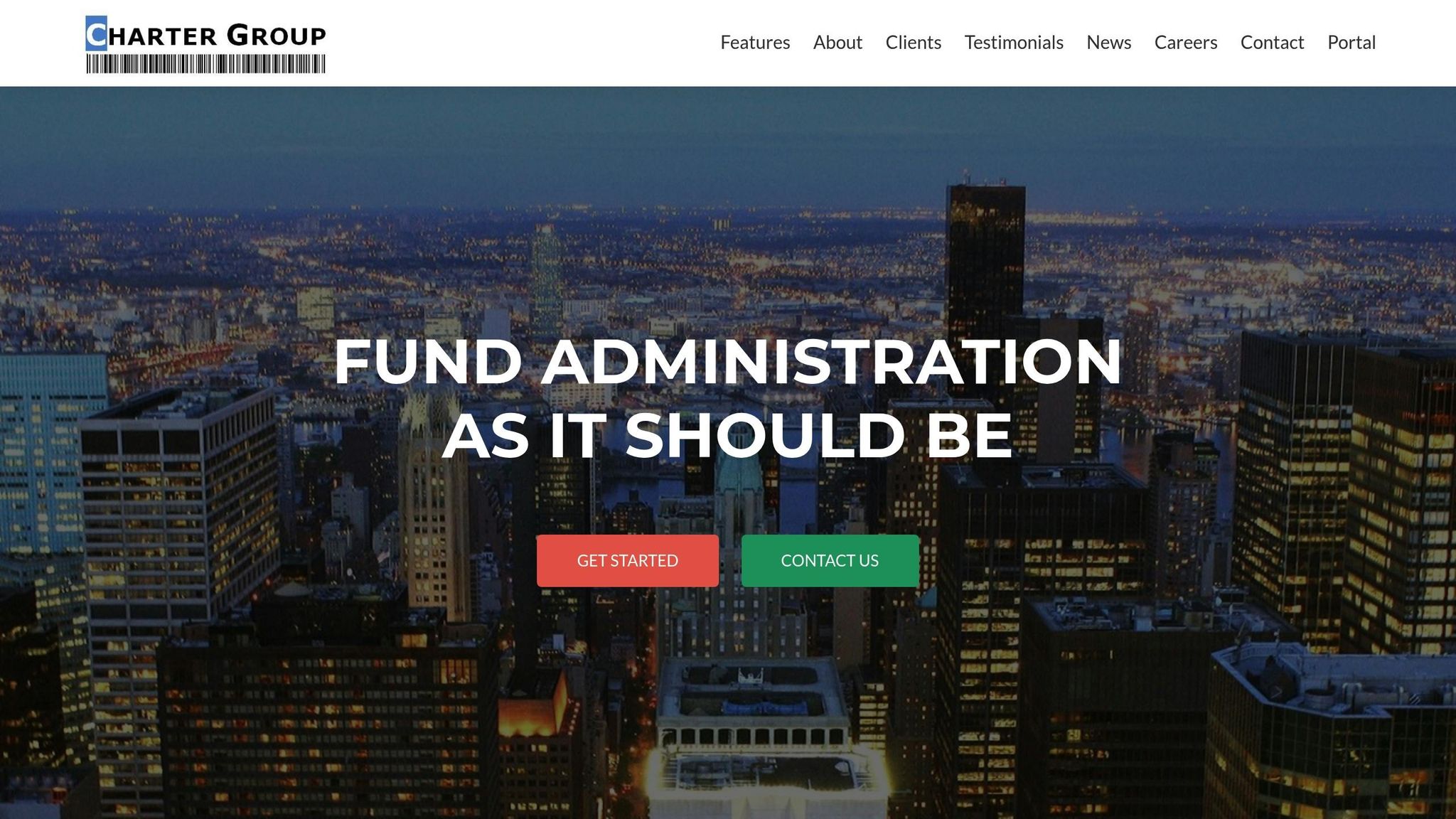
Charter Group Fund Administration takes compliance and fund management to the next level by integrating AML/KYC processes directly into its broader fund administration platform. This unified approach brings together compliance, accounting, NAV calculations, and investor reporting, offering a seamless solution for offshore funds navigating complex regulatory landscapes.
Integrated Compliance Framework
Charter Group’s compliance services cover every corner of regulatory requirements, including AML/KYC checks, the Common Reporting Standard (CRS), and the Foreign Account Tax Compliance Act (FATCA). This comprehensive approach is particularly beneficial for offshore funds operating across various jurisdictions. By leveraging advanced RegTech solutions, Charter Group automates data management and reporting, cutting down manual tasks while boosting accuracy across compliance functions.
For instance, when a hedge fund launched in the Cayman Islands, Charter Group implemented an advanced KYC process. This included automated beneficial ownership discovery and enhanced due diligence for high-risk investors. Their compliance team worked closely with local legal experts to ensure all documentation aligned with Cayman regulatory standards. The result? A successful fund launch with ongoing adherence to international AML requirements.
Specialized Offshore Jurisdiction Expertise
Charter Group’s deep understanding of offshore regulations is a standout feature. They cater to funds domiciled in key offshore jurisdictions like the Cayman Islands and British Virgin Islands, where regulatory demands often differ from onshore markets. This expertise is critical, especially as global AML fines surpassed $5 billion in 2023, underscoring the steep financial risks tied to non-compliance.
The firm is also proactive in updating its compliance programs, guiding clients through new regulatory changes with a well-planned approach, ensuring a smooth adjustment to evolving standards.
Technology-Driven Compliance Solutions
Charter Group employs cutting-edge digital tools to simplify onboarding, enable real-time monitoring, and conduct risk assessments. These technologies minimize manual effort while delivering a smooth experience for fund managers and investors alike. Their secure investor portal provides real-time access to fund data and compliance documents, streamlining both investor communication and regulatory reporting. This tech-driven approach allows for tailored solutions that meet the unique needs of different fund types.
"The Charter Group team provide the administration for a Cayman Islands offshore fund for an advisory client of Edale. Their systems and day to day business operation and support were first rate." – Lawrie Chandler, Director at Edale Group
Diverse Fund Type Coverage
Charter Group adapts its AML/KYC processes to fit the specific needs of each fund, considering factors like fund type, investor base, and jurisdiction. They support a wide range of funds, including hedge, managed, listed, crypto, and boutique funds. For higher-risk vehicles, such as crypto funds or those with intricate ownership structures, additional scrutiny is applied to ensure compliance.
Their technology infrastructure enhances secure document management and maintains detailed audit trails, which are crucial for investor due diligence and regulatory inspections. With features like continuous transaction monitoring, periodic risk reviews, and automated alerts for suspicious activities, Charter Group helps funds maintain a solid compliance framework while operating efficiently in offshore environments.
Feature Comparison Table
Here’s a breakdown of AML/KYC tools, focusing on their core features, global reach, strengths for offshore funds, and pricing models:
| Tool | Core Features | Jurisdictional Coverage | Offshore Fund Strengths | Pricing Approach |
|---|---|---|---|---|
| Fenergo | End-to-end client onboarding, digital identity verification, automated due diligence, regulatory reporting, transaction monitoring | Global | Easily integrates with existing systems, helps financial institutions streamline compliance | Custom pricing, requires annual commitment |
| KYC-Chain | Advanced KYC verification, automated risk scoring, identity fraud prevention, real-time monitoring | Global | Excels in identifying beneficial ownership and managing complex regulatory requirements | Custom pricing, requires annual commitment |
| ComplyAdvantage | AI-powered risk scoring, real-time transaction monitoring, integrated KYC/CDD processes | Global | Provides AI-driven insights and scalable cloud solutions for expanding funds | Custom pricing, based on volume |
| Refinitiv World-Check | Comprehensive sanctions screening, adverse media monitoring, global PEP coverage | Global | Trusted for offshore compliance due to its extensive global database | Custom pricing, based on volume |
| Feedzai | AI-powered transaction monitoring, behavioral analytics, fraud detection | Global | Real-time risk management and advanced fraud detection capabilities | Custom enterprise pricing |
| LexisNexis Risk Solutions | Identity verification, sanctions screening, transaction monitoring, global database access | Global | Strong integration options and broad compliance coverage | Custom enterprise pricing |
| Charter Group Fund Administration | Fund administration with AML/CRS/FATCA compliance, investor portal, NAV calculations | Specialized in offshore jurisdictions (Cayman Islands, BVI) | Combines compliance with fund administration, tailored for offshore expertise | Custom service-based pricing |
Insights on Features and Pricing
Each tool offers distinct strengths, particularly for offshore funds. For instance, platforms like Refinitiv World-Check and LexisNexis Risk Solutions provide extensive global coverage, making them reliable choices for wide-reaching compliance needs. On the other hand, Charter Group Fund Administration stands out by merging AML/KYC compliance with fund administration services, specifically tailored for offshore jurisdictions like the Cayman Islands and BVI.
Pricing models vary significantly, with most providers requiring annual commitments. Free trials are uncommon, and many solutions use volume-based pricing, which can be advantageous for larger funds. However, boutique funds may benefit more from service-based pricing, such as that offered by Charter Group.
Integration capabilities also differ. While many platforms provide robust APIs for seamless integration, Charter Group simplifies processes by combining compliance and fund administration into a single, streamlined solution.
These differences highlight the importance of choosing a tool that aligns with your fund’s specific compliance needs and operational goals, especially in the demanding landscape of offshore regulations.
How to Choose the Right AML/KYC Solution for Offshore Funds
Choosing the right AML/KYC solution for offshore funds is no small task. Offshore fund managers face a maze of regulations and cross-border challenges, making compliance and operational efficiency top priorities. Here’s what to keep in mind when evaluating solutions.
Jurisdictional expertise is a must-have. Offshore funds operate across diverse regulatory environments, each with its own set of rules. For instance, jurisdictions like the Cayman Islands, BVI, and Luxembourg have distinct compliance requirements. Your chosen solution should be well-versed in these frameworks, including CRS and FATCA. For example, the Cayman Islands’ 2025 CRS compliance rules highlight the importance of timely and accurate submissions. This expertise should also align with the operational demands of a growing fund.
Scalability is another critical factor. As your fund expands, the solution must handle increasing transaction volumes and streamline onboarding processes for new investors. Advanced platforms can cut manual reviews down to just 5–10% of compliance activities, allowing teams to focus on higher-risk cases. Seamless scalability ensures that growth doesn’t come at the expense of efficiency.
Integration capabilities are equally important. The solution should connect effortlessly with your existing systems – whether it’s fund administration platforms, investor portals, or reporting tools. Top-tier options offer robust APIs that automate data sharing and improve accuracy. When paired with comprehensive fund administration services, this integration simplifies workflows and enhances overall compliance.
On top of that, data privacy and security must be non-negotiable. Offshore funds deal with sensitive investor information, so the solution should comply with global data protection standards like GDPR and U.S. privacy laws. Features like strong encryption, secure data storage, and clear data handling policies are essential to safeguarding this information.
The total cost of ownership is another key consideration. While initial fees for AML/KYC solutions can range from $12,000 to over $100,000 annually, the long-term savings often outweigh the cost. For instance, AI-driven solutions can reduce false positives by up to 85%, cutting overall compliance expenses significantly.
Providers such as Charter Group Fund Administration offer a good example of how integrated compliance and fund management can simplify offshore regulation. Their services combine tailored support for AML, CRS, and FATCA requirements with investor portals and reporting tools, creating a unified compliance workflow designed for offshore jurisdictions.
To make the best choice, start with a thorough needs assessment. Test how well the solution integrates with your current systems, and ensure your team is trained to navigate evolving regulations. As the landscape shifts – particularly for emerging asset classes like crypto funds – flexibility to adapt to new rules will be vital for long-term success.
Ultimately, the best approach is to partner with a provider that understands the unique challenges of offshore fund administration. Look for a solution that combines cutting-edge technology with deep regulatory expertise tailored to the specific requirements of your jurisdiction. This balance is key to navigating the complexities of offshore fund compliance effectively.
Conclusion
Choosing the right AML/KYC tools is essential for offshore funds navigating today’s intricate regulatory environment. The global rise in AML fines underscores the severe financial risks tied to non-compliance. Offshore funds face even greater challenges, as they operate across multiple jurisdictions with varying regulatory demands and steep penalties for missteps. This has driven the industry to adopt advanced technologies to keep pace.
Technology is transforming compliance for offshore funds. AI-powered solutions can reduce false-positive rates for suspicious activity alerts by up to 85%, enabling compliance teams to focus on genuine risks rather than wasting time on unnecessary alerts. This shift is redefining how funds scale their operations while maintaining strong oversight.
AI and machine learning are tackling the daily hurdles of compliance in this sector. Tasks like analyzing complex ownership structures, managing cross-border transactions, and monitoring layered corporate entities – once reliant on manual reviews – can now be handled automatically in real time. These platforms also screen clients against global watchlists and generate compliance reports with minimal human input. This is particularly valuable as funds venture into newer asset classes, such as crypto, where traditional compliance methods often struggle to keep up.
"AI is revolutionizing fund management by enhancing decision-making, improving forecasting, and enabling real-time analytics to navigate market volatility."
– Charter Group Fund Administration
Automation has become the backbone of effective offshore fund administration. Modern platforms can continuously screen clients, flag suspicious transactions, and produce compliance reports autonomously. This allows compliance teams to shift their focus from routine tasks to strategic decisions and in-depth risk assessments.
The regulatory landscape is evolving rapidly, making flexibility a key factor for long-term success. For instance, the expanded Bank Secrecy Act rules for private funds, set to take effect on January 1, 2028, highlight how quickly compliance requirements can change. Funds that invest in adaptable, technology-driven solutions can navigate these shifts without disrupting their operations.
Providers like Charter Group Fund Administration demonstrate how integrated platforms simplify offshore operations. Their services combine automated due diligence, investor portal reporting, and full support for AML, CRS, and FATCA requirements, specifically designed for jurisdictions like the Cayman Islands. This approach underscores the importance of partnering with providers who understand both the technological and regulatory demands of offshore fund administration.
Adopting advanced AML/KYC tools is no longer optional – it’s essential for thriving in today’s regulated offshore fund industry. Funds leveraging technology-driven compliance solutions can streamline investor onboarding, cut operational costs, and strengthen risk management. As the offshore fund landscape continues to evolve, these technological advancements will be critical for long-term success.
FAQs
What should you look for in an AML/KYC tool for offshore fund management?
When choosing an AML/KYC tool for offshore fund management, it’s crucial to ensure it can manage core fund administration tasks such as accounting, NAV calculations, and compliance support for regulations like AML, CRS, and FATCA. The tool should also be tailored to meet the specific requirements of offshore jurisdictions, such as the Cayman Islands, and accommodate various fund types, including hedge funds, crypto funds, and boutique investment firms.
Look for a solution that simplifies workflows, maintains compliance with regulations, and promotes transparency for both fund managers and investors.
How can AI-powered tools improve AML/KYC compliance for offshore funds?
AI-driven tools are transforming AML/KYC compliance for offshore funds by simplifying complex tasks, increasing precision, and cutting down on manual work. These tools can sift through massive datasets at lightning speed, spotting potential risks, flagging unusual activities, and ensuring adherence to regulatory standards.
Using machine learning and natural language processing, these solutions adjust to changing compliance rules and uncover patterns that traditional approaches might overlook. This doesn’t just make operations smoother – it also equips offshore fund administrators to handle audits and regulatory reviews with greater efficiency.
What challenges do offshore funds face with complex ownership structures, and how can AML/KYC tools help manage these issues?
Offshore funds often navigate complex ownership structures, involving layers of investors, entities, and jurisdictions. This intricate setup can complicate compliance with anti-money laundering (AML) and know-your-customer (KYC) regulations. Identifying ultimate beneficial owners (UBOs) and handling cross-border regulatory demands are particularly challenging in this environment.
Modern AML/KYC tools address these hurdles by automating critical tasks like UBO identification, risk evaluations, and continuous monitoring. By leveraging technologies such as AI and machine learning, these tools sift through vast datasets, highlight potential risks, and ensure adherence to global compliance standards. For offshore funds, this means greater transparency, fewer manual errors, and streamlined regulatory reporting – key advantages for operating in regions like the Cayman Islands.
